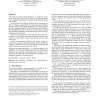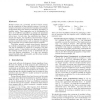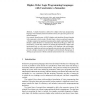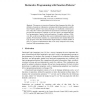277 search results - page 27 / 56 » A First-Order Theory of Types and Polymorphism in Logic Prog... |
ICFP
2004
ACM
14 years 7 months ago
2004
ACM
Useful type inference must be faster than normalization. Otherwise, you could check safety conditions by running the program. We analyze the relationship between bounds on normali...
POPL
2006
ACM
14 years 8 months ago
2006
ACM
This article investigates formal properties of a family of semantically sound flow-sensitive type systems for tracking information flow in simple While programs. The family is ind...
POPL
1996
ACM
13 years 11 months ago
1996
ACM
Module systems are a powerful, practical tool for managing the complexity of large software systems. Previous attempts to formulate a type-theoretic foundation for modular program...
TLCA
2007
Springer
14 years 1 months ago
2007
Springer
A Kripke Semantics is defined for a higher-order logic programming language with constraints, based on Church’s Theory of Types and a generic constraint formalism. Our syntactic...
LOPSTR
2005
Springer
14 years 1 months ago
2005
Springer
We propose an extension of functional logic languages that allows the definition of operations with patterns containing other defined operation symbols. Such “function patterns...




